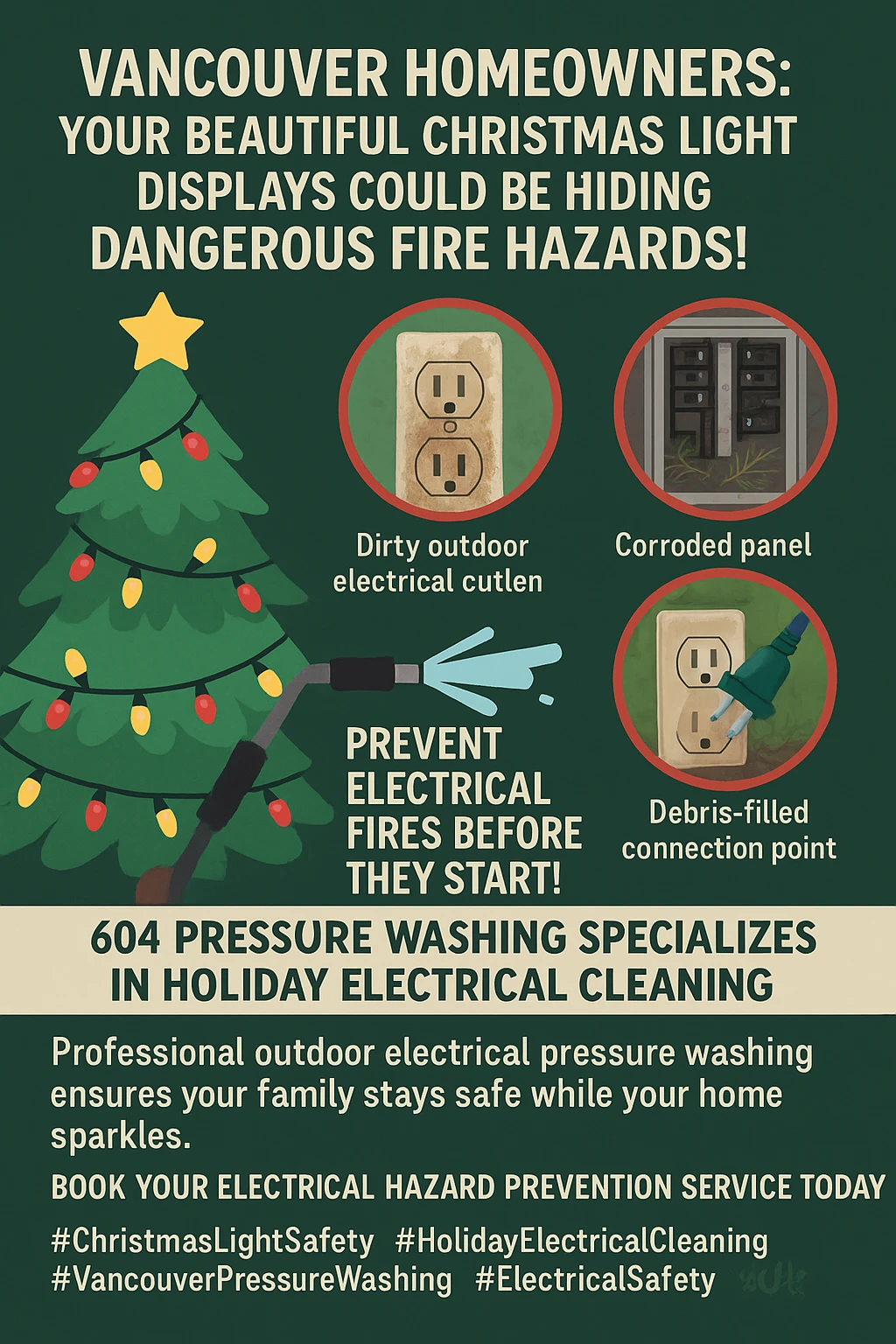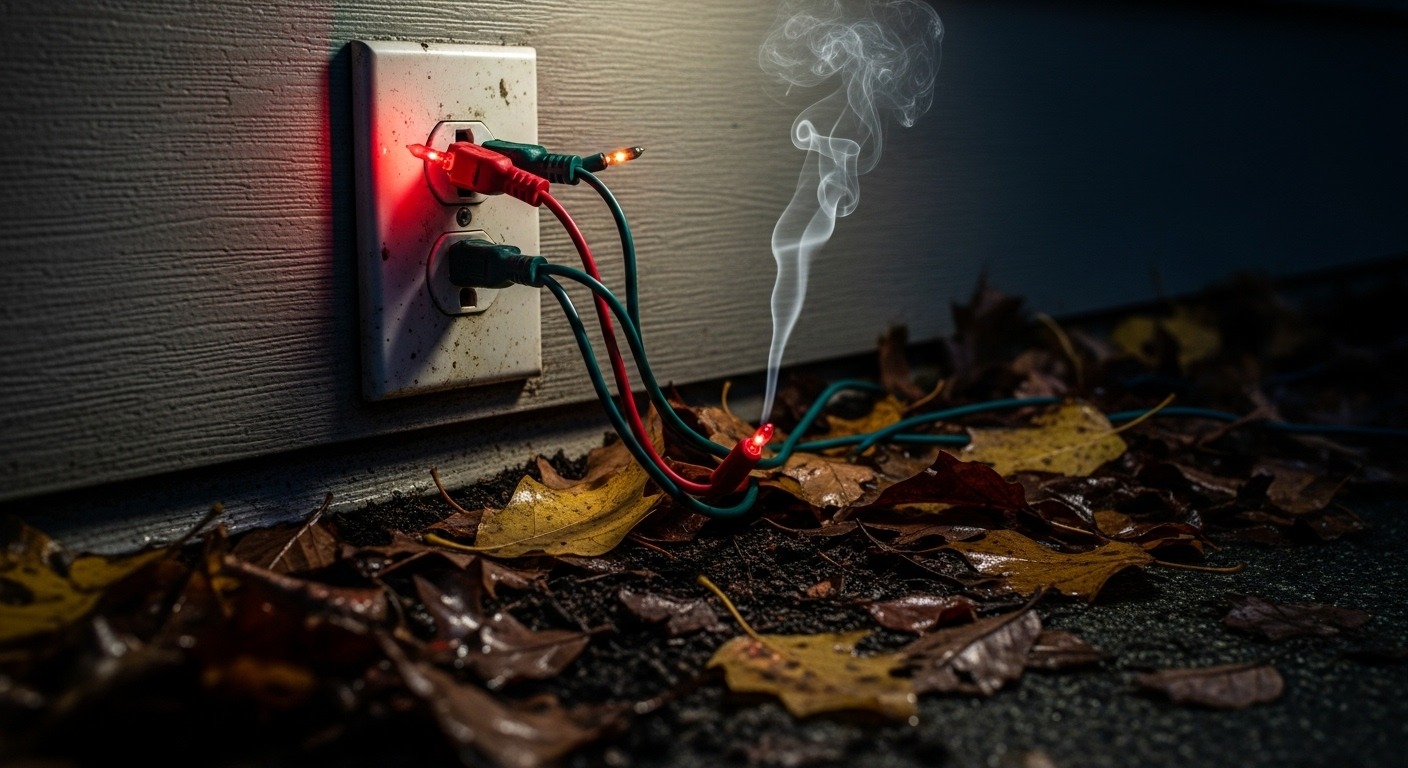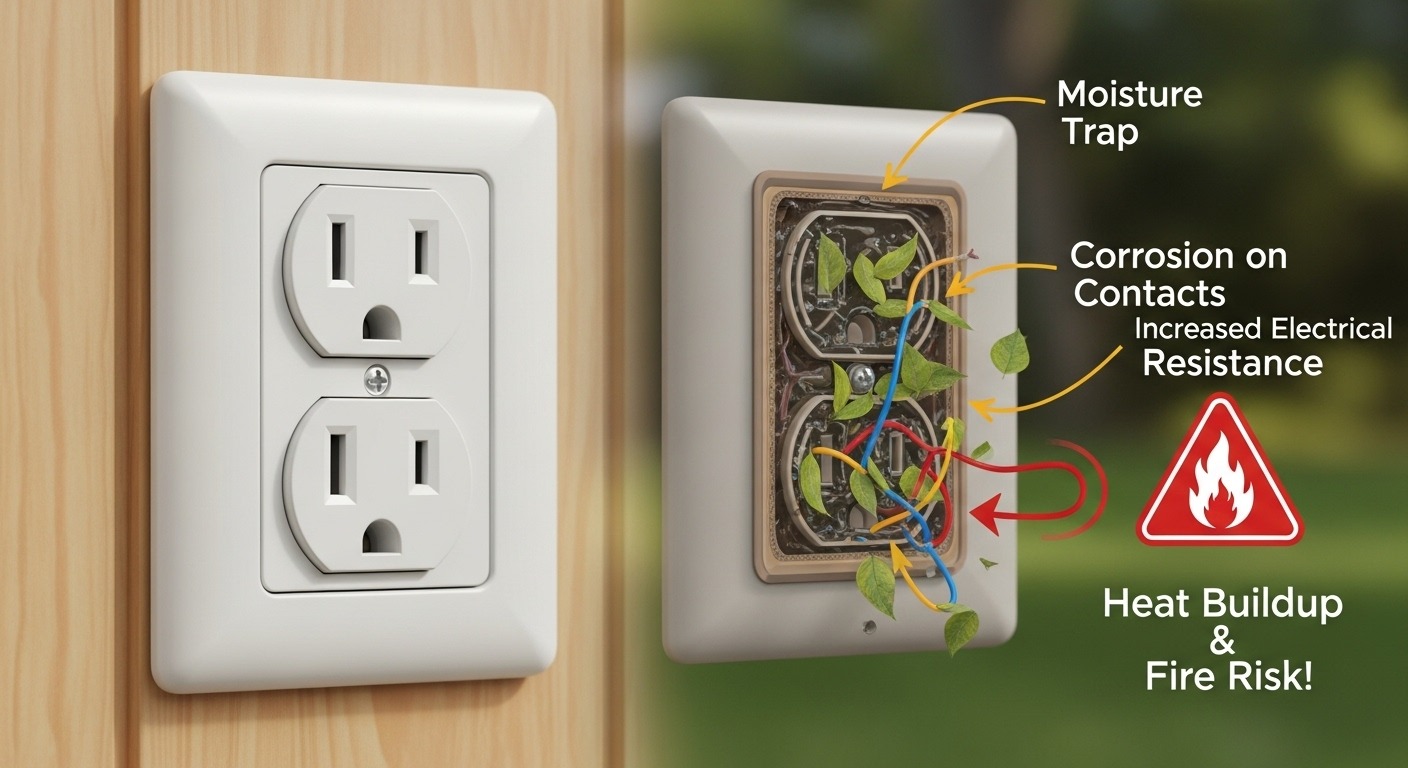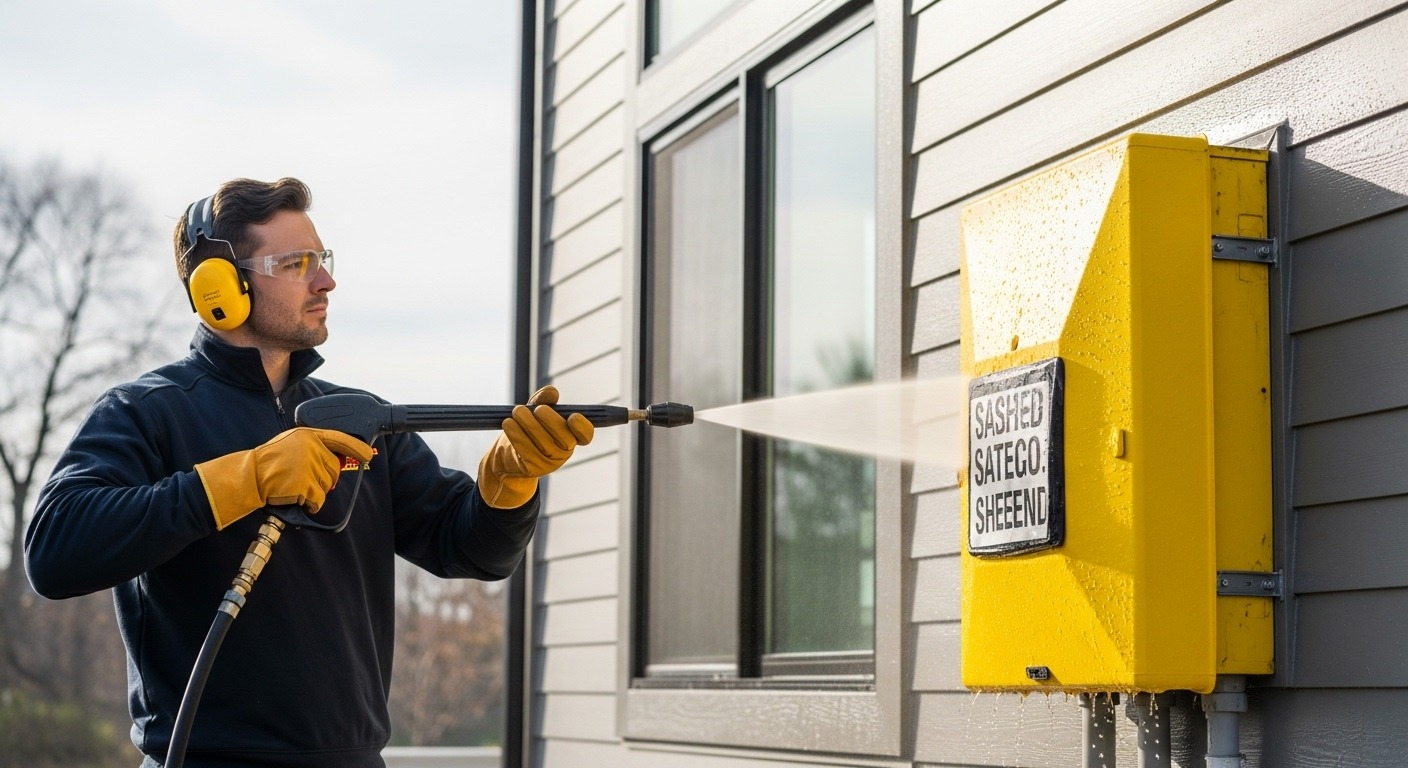Why Vancouver’s Christmas Light Displays Are Creating Fire Hazards on Your Home (And How Pressure Washing Your Electrical Areas Prevents Holiday Disasters)
Worried about electrical fires ruining your holiday season? Vancouver’s unique climate creates the perfect storm for Christmas lighting disasters, but there’s a simple maintenance trick that most homeowners completely overlook.
Picture this: you’re sipping hot cocoa, admiring your gorgeous holiday light display, when suddenly you smell something burning. That festive glow you worked so hard to create? It just became your worst nightmare. As someone who’s spent countless hours helping Vancouver homeowners navigate the tricky world of electrical safety, I can tell you that this scenario plays out more often than you’d think – and it’s almost always preventable. [IMAGE PLACEHOLDER FOR IMAGE1]
Here’s the thing that blows my mind: most people spend hundreds of dollars on elaborate Christmas light displays but completely ignore the one maintenance step that could save their entire home. We’re talking about pressure washing your electrical areas before you even think about plugging in that first strand of lights. I know, I know – it sounds boring compared to picking out twinkling LED patterns, but trust me when I say this simple step is the difference between a magical holiday season and a call to your insurance company.
Vancouver’s coastal climate creates this wild combination of moisture, debris, and electrical stress that turns innocent holiday decorating into a potential fire hazard. The stats are honestly terrifying: British Columbia has seen 113 Christmas-related fires in just the past decade, resulting in 15 injuries, four deaths, and over $14.5 million in property damage. What makes this even more heartbreaking is that most of these disasters could have been prevented with proper electrical maintenance – including strategic pressure washing of electrical areas.
Key Outtakes:
- Vancouver’s humid coastal climate accelerates electrical corrosion, making regular maintenance crucial for holiday lighting safety
- Professional pressure washing of electrical areas removes debris that can trap moisture and create fire hazards
- Proper electrical area cleaning before holiday installations can prevent the majority of Christmas light-related fires
- Ground Fault Circuit Interrupter (GFCI) protection is essential when combining pressure washing with electrical maintenance
- The cost of preventive maintenance is less than 1% of typical electrical fire damage expenses

The Hidden Dangers Lurking in Your Holiday Light Setup

Let me paint you a picture of what’s actually happening around your electrical components right now. While you’re inside planning your holiday menu, Mother Nature is busy creating the perfect conditions for electrical mayhem outside your home. Vancouver’s notorious rain, combined with fallen leaves, dirt, and organic debris, creates this gross cocktail of conductive material that settles around your outdoor outlets and electrical panels. [IMAGE PLACEHolder FOR IMAGE2]
Here’s where it gets scary: Christmas lights can catch fire when there is a failure in the wiring or damage caused to the lights or their wiring systems, particularly when moisture infiltrates connection points that should be protected. That innocent-looking pile of wet leaves sitting against your electrical panel? It’s basically a fire starter waiting for the right electrical conditions to ignite.
The physics behind this is actually fascinating in the most terrifying way possible. When debris accumulates around electrical components, it creates these little moisture traps that prevent proper drainage and airflow. Over time, this trapped moisture starts breaking down protective seals and weatherproofing materials. Then, when you plug in your holiday lights and suddenly demand way more power from your electrical system, those compromised connections start heating up.
What makes Vancouver particularly dangerous is our unique climate pattern. We get this concentrated wet season from October through March – exactly when people are installing and running holiday lighting displays. The combination of persistent moisture and increased electrical loads creates conditions that are basically begging for electrical failures. Add in our frequent freeze-thaw cycles that can crack protective covers and seals, and you’ve got a recipe for disaster.
The really insidious part is how gradual this process can be. Electrical failures don’t always announce themselves with dramatic sparks and smoke. Sometimes corrosion builds up slowly over months or years, gradually increasing electrical resistance until suddenly you have overheating conditions that can ignite surrounding materials. By the time you notice something’s wrong, you might already be dealing with a full-blown electrical fire.
How Pressure Washing Becomes Your Electrical Safety Superhero

Now, before you start thinking I’ve lost my mind suggesting that water and electricity should get anywhere near each other, let me explain how professional pressure washing actually makes your electrical systems safer, not more dangerous. The key is understanding that we’re not hosing down live electrical components like some kind of electrical cowboy – we’re strategically removing the accumulated debris and moisture-trapping materials that create hazardous conditions in the first place. [IMAGE PLACEHOLDER FOR IMAGE3]
Power washing removes built-up dirt and grime that can make outdoor electrical components more susceptible to moisture infiltration and subsequent failure. Think of it as spring cleaning for your electrical systems, except way more important because we’re talking about preventing house fires rather than just improving curb appeal.
The process starts with comprehensive electrical system protection. Professional technicians identify every electrical component in the work area and implement multiple layers of protection before any water touches any surface. We’re talking about weatherproof covers, temporary barriers, and systematic isolation of electrical circuits to ensure that cleaning operations never compromise safety. It’s like creating a safety bubble around each electrical component while systematically removing all the hazardous debris that’s accumulated around them.
Here’s what most people don’t realize: that gross buildup of leaves, dirt, and organic matter around your electrical panels isn’t just unsightly – it’s actively working against your electrical safety systems. When debris traps moisture against electrical enclosures, it creates conditions where water can penetrate seals and gaskets that are designed to keep your electrical components dry and safe. Professional pressure washing removes these moisture traps while providing opportunities to inspect and maintain the protective barriers that keep your electrical systems operating safely.
The timing of electrical area pressure washing is absolutely critical for maximum safety benefits. Pre-seasonal cleaning, typically conducted in late fall before any holiday decorations go up, ensures that electrical systems are in optimal condition before they experience the increased loads and environmental stresses of holiday lighting installations. This proactive approach catches potential problems while electrical systems are operating under normal conditions, rather than waiting until they’re stressed by holiday lighting loads and winter weather conditions.
Professional pressure washing equipment designed for electrical area maintenance operates at precisely controlled pressures and uses specialized nozzles that provide thorough cleaning without creating safety hazards. We’re not talking about blasting electrical components with high-pressure water – we’re using sophisticated techniques that clean surrounding areas while maintaining strict safety margins around all electrical components.
The Science Behind Electrical Fires and Why Prevention Matters So Much

Understanding the actual mechanisms behind electrical fires helps explain why preventive maintenance is so much more effective than trying to deal with problems after they’ve already started developing. The statistics are honestly sobering: according to the National Fire Protection Association, 44% of home Christmas tree fires involve electrical issues like damaged cords, overloaded outlets, or compromised lighting systems.
The heat generation characteristics of different lighting technologies play a huge role in determining fire risk levels. LED lights are substantially less likely to cause fires because they generate significantly less heat compared to traditional incandescent bulbs. However, even LED systems become dangerous when electrical connections are compromised through moisture exposure or when debris interferes with proper heat dissipation around connection points.
Here’s where the science gets really interesting: electrical failures often follow predictable patterns that can be interrupted through proper maintenance. Water exposure leads to corrosion of electrical components, which increases electrical resistance, which creates heat buildup, which can eventually reach ignition temperatures for surrounding materials. Each step in this process can be prevented or reversed through appropriate maintenance, but once the chain reaction starts, it becomes progressively more difficult to interrupt.
The role of ground fault protection becomes absolutely critical when moisture and electrical systems interact. GFCIs are essential for electrical safety in wet environments, as they detect imbalances in electrical circuits and immediately shut off power when irregularities are detected. This technology represents one of the most important advances in residential electrical safety, but it only works properly when electrical systems are properly maintained and GFCI devices are regularly tested.
The combustion triangle – heat, fuel, and oxygen – helps explain why debris removal around electrical components is so critical for fire prevention. Even if electrical components generate heat through normal operation or minor malfunctions, fires can only start when combustible materials are present to serve as fuel. Professional cleaning removes these potential fuel sources while maintaining the electrical systems in conditions that minimize unwanted heat generation. It’s a two-pronged approach that systematically dismantles the conditions required for electrical fires to start.
Frequently Asked Questions About Electrical Safety and Holiday Lights

Is it really safe to use a pressure washer near electrical outlets and panels?
It’s only safe when performed by trained professionals who follow strict safety protocols. This includes de-energizing circuits, using waterproof covers, maintaining safe distances, and using low-pressure settings with specialized nozzles. DIY pressure washing near electrical components is extremely dangerous and is not recommended under any circumstances.
How often should I have my electrical areas professionally cleaned?
For most Vancouver homeowners, an annual cleaning in the late fall (October or November) is ideal. This timing ensures that debris accumulated over the summer and early fall is removed right before you install your holiday lights, providing a clean and safe starting point for the high-demand winter season.
Can I just use a leaf blower or a garden hose instead?
While removing loose, dry leaves with a leaf blower is a good start, it doesn’t address the caked-on grime and organic matter that trap moisture against surfaces. A garden hose lacks the precision and power to effectively remove this buildup and can actually introduce moisture into areas without the controlled process that professionals use. Professional pressure washing is a comprehensive cleaning method that addresses the root cause of moisture-related electrical hazards.
Won’t pressure washing damage my home’s siding or paint?
When done correctly by a professional, pressure washing is completely safe for your home’s exterior. Professionals use a technique called “soft washing” for sensitive surfaces like siding, which relies on eco-friendly cleaning solutions and low pressure to remove dirt and organic growth without causing any damage.
What are the first signs of an electrical problem with my Christmas lights?
Be vigilant for flickering or dimming lights, a buzzing sound coming from outlets or connections, circuit breakers that trip frequently, or any discoloration or melting on plugs or cords. If you notice any of these signs, unplug the lights immediately and consult a licensed electrician. A burning smell is a critical warning sign that requires immediate action, as you might be dealing with a developing electrical fault.
Wrapping Up: Your Holiday Safety Checklist

The magic of the holiday season shouldn’t be overshadowed by the preventable risk of an electrical fire. By understanding the unique challenges our Vancouver climate presents and taking proactive steps, you can ensure your home remains a safe and festive sanctuary. Integrating professional pressure washing of your electrical areas into your pre-holiday routine isn’t just another chore; it’s one of the most effective and overlooked investments you can make in your family’s safety.
Don’t let a year’s worth of accumulated grime and debris turn your holiday celebration into a statistic. This year, before you untangle a single strand of lights, take a look at the areas around your outdoor outlets, breaker box, and service mast. If you see buildup, it’s time to call in the professionals. A clean electrical environment is a safe electrical environment – and that’s the foundation for a truly happy and worry-free holiday season.

